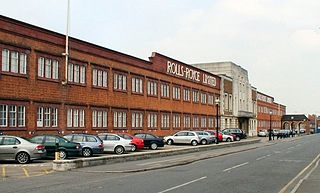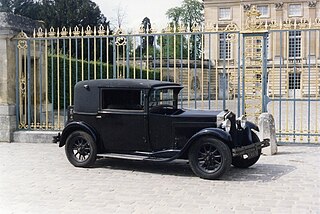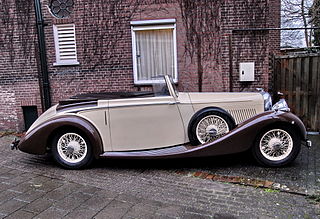Bentley Motors Limited is a British designer, manufacturer and marketer of luxury cars and SUVs. Headquartered in Crewe, England, the company was founded by W. O. Bentley (1888–1971) in 1919 in Cricklewood, North London, and became widely known for winning the 24 Hours of Le Mans in 1924, 1927, 1928, 1929 and 1930. Bentley has been a subsidiary of the Volkswagen Group since 1998 and consolidated under VW's premium brand arm Audi since 2022.

H. J. Mulliner & Co. was a well-known British coachbuilder operating from Bedford Park, Chiswick, West London. The company which owned it was formed by H J Mulliner in 1897 but the business was a continuing branch of a family business founded in Northampton in the 1760s to hire out carriages. In December 1909 the controlling interest in this company passed to John Croall & Sons of Edinburgh. Croall sold that interest to Rolls-Royce in 1959.

The Bentley T-series is a luxury automobile produced by Bentley Motors Limited in the United Kingdom from 1965 to 1980. It was announced and displayed for the first time at the Paris Motor Show on 5 October 1965 as a Bentley-badged version of the totally redesigned Rolls-Royce Silver Shadow.

Mulliner Park Ward was a coachbuilder formed as a subsidiary by Rolls-Royce in 1961 to supply it custom bodywork for its automobiles. Located in Hythe Road, Willesden, London, it was created by merging two existing Rolls-Royce properties, Park Ward of Willesden, London, a subsidiary since 1939 and H. J. Mulliner & Co. of Chiswick, a subsidiary since 1959. It principally built bodies and interiors for Rolls-Royce and Bentley motor cars, but also others such as Alvis. The coachbuilding business closed in 1991 but the Mulliner name is used for the personal commissioning department of the current Bentley manufacturer.

The Bentley R Type is the second series of post-war Bentley automobiles, produced from 1952 to 1955 as the successor the Mark VI. Essentially a larger-boot version of the Mk VI, the R type is regarded by some as a stop-gap before the introduction of the S series cars in 1955. As with its predecessor, a standard body was available as well as coachbuilt versions by firms including H. J. Mulliner & Co., Park Ward, Harold Radford, Freestone and Webb, Carrosserie Worblaufen and others.
Park Ward was a British coachbuilder founded in 1919 which operated from Willesden in North London. In the 1930s, backed by Rolls-Royce Limited, it made technical advances which enabled the building of all-steel bodies to Rolls-Royce's high standards. Bought by Rolls-Royce in 1939, it merged with H. J. Mulliner & Co. in 1961 to form Mulliner Park Ward.

Thrupp & Maberly was a British coachbuilding business based in the West End of London, England. Coach-makers to Queen Victoria they operated for more than two centuries until 1967 when they closed while in the ownership of Rootes Group.

Rolls-Royce Limited was a British luxury car and later an aero-engine manufacturing business established in 1904 in Manchester by the partnership of Charles Rolls and Henry Royce. Building on Royce's good reputation established with his cranes, they quickly developed a reputation for superior engineering by manufacturing the "best car in the world". The business was incorporated as "Rolls-Royce Limited" in 1906, and a new factory in Derby was opened in 1908. The First World War brought the company into manufacturing aero-engines. Joint development of jet engines began in 1940, and they entered production in 1944. Rolls-Royce has since built an enduring reputation for the development and manufacturing of engines for military and commercial aircraft.

Hooper & Co. was a British coachbuilding business for many years based in Westminster London. From 1805 to 1959 it was a notably successful maker, to special order, of luxury carriages, both horse-drawn and motor-powered.
Abbott of Farnham, E D Abbott Limited was a British coachbuilding business based in Farnham, Surrey, trading under that name from 1929. A major part of their output was under sub-contract to motor vehicle manufacturers. The business closed in 1972.

James Young Limited was a top class British coachbuilding business in London Road, Bromley, England.
Mulliners Limited of Birmingham was a British coachbuilding business in Bordesley Green, with factories in Bordesley Green and Cherrywood Roads. It made standard bodies for specialist car manufacturers. In the 19th century there were family ties with founders Mulliners of Northampton and the businesses of other Mulliner brothers and cousins but it became a quite separate business belonging to Herbert Mulliner.

Weymann Fabric Bodies is a patented design system for fuselages for aircraft and superlight coachwork for motor vehicles. The system used a patent-jointed wood frame covered in fabric. It was popular on cars from the 1920s until the early 1930s as it reduced the usual squeaks and rattles of coachbuilt bodies by its use of flexible joints between body timbers.

Freestone and Webb were English coachbuilders who made bodies for Rolls-Royce and Bentley motor cars but also built bodies on other chassis including Alfa Romeo, Packard, and Mercedes-Benz.

Barker & Co. was a British coachbuilder, a maker of carriages and in the 20th century bodywork for prestige cars, including Rolls-Royce, Bentley, and Daimler.
Jack Barclay Bentley is the world's largest and oldest Bentley dealership and part of the H.R. Owen motor retailing group.

New Avon was a British vehicle coachbuilder. The company, based in Warwick, was started when a Ben Tilton and a Captain Philips trading as Avon Coachworks went into business in 1919 to make bodywork for cars. Following a change of ownership and financial reconstruction it became New Avon in 1922.

Joseph Cockshoot was an English coachbuilder and car dealer based in Manchester.

Arnold of Manchester, William Arnold (Manchester) Limited owned the Arnold of Manchester coachbuilding business in Chorlton-cum-Medlock, Manchester. Arnold's began making car bodies in 1910 and between the wars built many bodies for famous brands of car. They also built motor coaches. They tried their hand at bus bodies, both single-deck and double-deck between 1928 and 1931. War ended production. After the Second World War they remained car sales and service agents.























